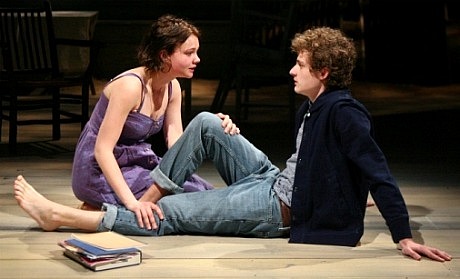You are the kind of dog you have. I’m a big fan of Golden Retrievers, the love dogs. I’m also partial to Labradors and Jack Russells. It follows that any guy who owns a Cane Corso Mastif that’s been trained to kill is some kind of belligerent macho ayehole. If I had any say in the matter of this four-year-old Brooklyn boy who was killed Friday by a Mastif, the boyfriend who owned this killer dog would do serious time.
Mulligan Ups Her Game
On Friday I bought two tickets to Through a Glass Darkly, the currently running theatrical adaptation of Ingmar Bergman’s 1961 film with Carey Mulligan in the lead role. With my flight landing at 6:20 pm I’d hoped the tickets were for a Sunday 8 pm performance, but I learned post-purchase that they were for a 3 pm show, so I asked Jett and Dylan to go in my place.
“I’ve never seen Bergman’s Through a Glass Darkly so yesterday’s performance was my first exposure,” Jett writes in an iPhone review. “Going by An Education and Wall Street 2 I’ve thought of Mulligan as a super-talent who might get typecast as the mopey girl with a child-like face. I now stand corrected. While she does employ that innocent-playful demeanor here, her role as Karin showed her ability to go really, really dark.
“I think this role was important because Mulligan has finally found something that she can attack all your senses [with], using sex, comedy, endearment and tormenting terror. She scared the fuck out of me during her schizophrenic monologues, and yet I felt touched during her teary-blank stares. A small, maybe irrelevant detail that she’s really breaking out of her sweet-girl stereotype is the unexpected nudity. Two instances, short, not a big deal but it still says something about how she wants to be perceived.
“No one has doubted Mullligan’s ability, but now she’s given the kind of gritty performance that every powerful actress needs in their repertoire — to go batshit crazy.”
“Carey Mulligan gives a powerful performance,” Dylan wrote last night. “Beautiful use of minimal props and set design. Has a few good laughs. Overall an impressive experience.”
From the broadwayworld.com synopsis: “Karin (Carey Mulligan) is the central figure in the lives of her family, not least because her own tenuous grip on reality keeps everyone in constant motion around her.
“On an annual vacation to a beautiful remote island [i.e., Bergman’s Faro in the film], tensions flare as her husband (Jason Butler Harner), father (Chris Sarandon) and brother (Ben Rosenfield) struggle over the best way to help her. When a legacy of denial and repression boils over, threatening the future of the entire family, Karin decides that she must take command of her own destiny.”
The Void
A Midwestern book publisher wrote about an old high school friend — a woman — with whom “we’re indirectly connected professionally through the Linked-In network.” He asked how I know her. I don’t know her at all, I said. “Linked In is as bad as Facebook in terms of utter meaninglessness,” I added. “I could be lying on the side of the road, bleeding to death and begging for an ambulance, and [your former high-school friend] could walk by and look at me and say to herself, ‘Wow, somebody who has the time should call an ambulance on their cell’ and then walk right on and hail a cab so she won’t be late to her Pilates class.”
No Protection
I woke up this morning at 8 am Paris time (i.e, 2 am Eastern) and then woke again at 5 am, or 11 am in Paris. The wifi is working perfectly in the place I’m staying in…very nice. And it rained this morning around 6 am. No screenings today because of Memorial Day. Jesus…Memorial Day. Every time it comes around I feel listless and conflicted.
It’s been over 65 years since Americans fought and won an unambiguously “good” war. I know i’ll never stop feeling sickened by the thought of over 58,000 guys having died in the Vietnam War. And I don’t feel much pride or see a whole lot of value in the death tallies from the Iraq and Afghanistan wars.
So it’s a holiday about despair, really. Despair and mixed feelings and, okay, little sprigs of pride. But I hate it when someone says “he gave his life for his country.” No soldier selflessly gives his life for his country. He’s in the wrong place at the wrong time and he gets shot or shrapnelled or blown up or burned to death, period. My old man, a Marine lieutenant who fought in the Pacific, carried a certain pride about having done his duty and risked death and helped defeat the Japanese. But he was mostly appalled and disgusted by what he experienced.
In the words of Paddy Chayefsky‘s Charlie Madison: “I don’t trust people who make bitter reflections about war. It’s always the generals with the bloodiest records who are the first to shout what a Hell it is. And it’s always the widows who lead the Memorial Day parades.
“We shall never end wars by blaming it on ministers and generals or warmongering imperialists or all the other banal bogies. It’s the rest of us who build statues to those generals and name boulevards after those ministers; the rest of us who make heroes of our dead and shrines of our battlefields.
“We wear our widows’ weeds like nuns and perpetuate war by exalting its sacrifices.
“War isn’t hell at all. It’s man at his best; the highest morality he’s capable of. It’s not war that’s insane, you see. It’s the morality of it. It’s not greed or ambition that makes war: it’s goodness. Wars are always fought for the best of reasons: for liberation or manifest destiny. Always against tyranny and always in the interest of humanity. So far this war, we’ve managed to butcher some ten million humans in the interest of humanity. It’s not war that’s unnatural to us — it’s virtue. As long as valor remains a virtue, we shall have soldiers.
“My brother died at Anzio – an everyday soldier’s death, no special heroism involved. They buried what pieces they found of him. But my mother insists he died a brave death and pretends to be very proud. Now my other brother can’t wait to reach enlistment age. That’ll be in September. It may be ministers and generals who blunder us into wars, but the least the rest of us can do is to resist honoring the institution.
“What has my mother got for pretending bravery was admirable? She’s under constant sedation and terrified she may wake up one morning and find her last son has run off to be brave.”
The Dumbness
How much of a Bluray marketing genius do you have to be to not know that the photo of Paul Newman on the new Bluray of The Hustler is from The Young Philadelphians (’59)? And if the Fox Home Video marketing ace who chose this photo did know of its origin, why did he/she use it?
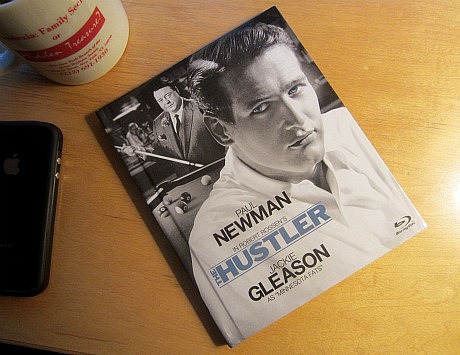
Any fan of The Hustler (’61) would spot the error in two seconds and be mildly irked by it, as I was when I bought this sucker last night at Kim’s Video. And any fan of The Young Philadelphians, a John O’Hara-styled soap opera, probably wouldn’t care for the grit and realism of The Hustler or would be too dumb to notice what I’m talking about in the first place.
The 33 year-old Newman looks preppy and straight-laced with neat, cleanly-parted hair in the Philadelphians photo. And he looks a tiny bit younger and smoother than he does in The Hustler, in which his hair is wiry and curly and his manner and expressions are mainly about anxiety and uncertainty — definitely a different emotional package. (The Hustler was shot in the fall of ’60, when Newman was 35, and opened in September ’61.)
It’s just a stupid-ass movie to use the Philadelphians pic. While the Fox Home Video brain surgeons were at it why didn’t they use a still of Newman from The Silver Chalice, with his Roman curls? Why not a still from The Outrage, for which Newman wore dark face makeup so he’d look like a Mexican? If you don’t care about being true to the source then why not? Go to town. Create your own Hustler mythology.
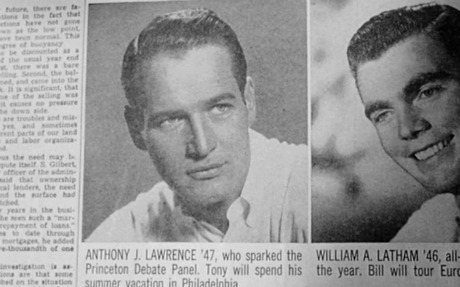
A DVD Beaver frame capture from The Young Philadelphians.
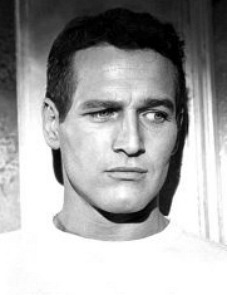
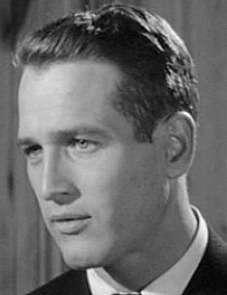
(l.) Newman’s Eddie Felson in The Hustler; (r.) Newman as Anthony Lawrence in The Young Philadelphians.
Nazi Perv
The only Nazi fascist-perversion films of the ’70s that I could stand watching weren’t exploitation fare — Liliana Cavani‘s The Night Porter and Pier Paolo Pasolini‘s Salo. A couple of times I’ve felt a slight urge to see Tinto Brass‘s Salon Kitty (which is now out on Bluray) but I can’t make myself rent it. I just can’t. I keep hearing Peter O’Toole calling this Italian schlockmeister, with whom he worked on Caligula, “Tinto Zinc.”
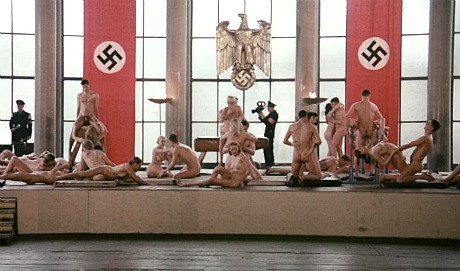
Tuesday, After Christmas
It’s been a bit more than a year since I saw Radu Muntean‘s Tuesday, After Christmas at the 2010 Cannes Film Festival. And now, at long last, it’s playing at Manhattan’s Film Forum until June 7th. It’s another one of those plain but gradually penetrating, long-take Romanian films in the tradition of Four Months, Three Weeks and Two Days and The Death of Mr. Lazarescu, which I can’t get enough of.
I love the slow studied atmosphere of these films, and their very subtle pay-offs that seem to strengthen and deepen the more you think about them afterwards. They’re pretty much essential viewing, even when they’re not totally top-of-the-line.
Tuesday, After Christmas doesn’t have quite the undertow or the sink-in quality of 4, 3, 2 but it’ll certainly do for now.
It’s about a paunchy, mild-mannered Romanian husband and father (Mimi Branescu) who’s not only having a prolonged affair with his daughter’s dentist (Maria Popistasu) but has fallen in love with her. On one level the film seems to be about the banality of family life with a threatening undercurrent that doesn’t seem to be growing…and yet it is. The fireworks finally happen when this nice, sensitive philanderer summons the courage to tell his wife Adriana (Mirela Opri?or). Their confrontation scene is so realistic and riveting that I’m thinking of catching Christmas again when I return to Manhattan. (I’ll be there early this evening.)
Here’s an excellent review from Salon‘s Andrew O’Hehir.
Good Saturday
The Air France flight to JFK leaves at 4:30 this afternoon, and arrives at 6:20 pm. It’s time to get back into the stateside swing. Several LA screenings and the LA Film Festival, etc. A Super 8 press junket next weekend. I’m returning with an idea that I have to somehow find an affordable scooter that isn’t too dinky-looking. Buzzing around Paris reminded me of the necessity. Scooters are the only way to push through heavy traffic, and LA is the king of that.

I bought tickets incidetnally, to today’s performance of Carey Mulligan‘s Though A Glass Darkly in Manhattan, thinking I could just make an 8 pm curtain. Then I was told it only performs today at 3 pm, and Monday is dark and I’m back to LA on Tuesday. So Jett and Dylan are going today instead; I’ve asked for quickie reviews from each.




Immigrant Song
Here’s a hand-held, poor-quality video of the European redband trailer for David Fincher‘s The Girl With The Dragon Tattoo. “The Feel-Bad Movie of Christmas”! Love that Zeppelin.
Double Standard
Roger Ebert has derided The Hangover, Part II for using perhaps the famous Vietnam War photograph ever — a capturing of a South Vietnamese military guy shooting a Vietcong guy in the head — for laughs. He called its appearance during the still-photo section at the end “a desecration.” But Ebert didn’t complain about Woody Allen‘s using the same photo for satiric purposes in Stardust Memories .

Allen’s character, a distracted film director, has a huge blowup of this photo in his living room in the film. It’s obviously a much smarter and more satiric use of the photo but it’s definitely meant to provoke and amuse.
If it’s okay for Allen to go there, you can’t fault Phillips for replicating the same photo, etc. Once a news artifact has been used in a comic-satric context, the toothpaste is out of the tube. Phillips imitated the shot to get an “oh, yeah” reaction from the audience, and Allen used the shot to say to the audience, “Look at how self-absorbed and angsty my character is.” Allen’s humor is on a much higher plane but he and Phillips basically did the same thing.
Couldn’t someone have claimed 40 years ago that Stanley Kubrick‘s using news footage of Nazi soldiers goose-stepping to the rhythm of Beethoven’s 9th in A Clockwork Orange was also a desecration?
So Ebert isn’t complaining about the photo per se being used for comic purposes — he’s complaining about the vulgarity and the coarseness of Phillips’ intent. Which most of us agree with. Phillips is shovelling mulch in this film. But I will defend to the death his right to use that photo for a laugh or whatever. Because he was only following Allen’s lead.
Respect
I’ve said two or three times that I don’t have to equate Lindsay Lohan with arrogant entitlement attitudes and self-destruction and drugs, etc. It was clear in Prairie Home Companion that she’s got that X-factor sparked, and it’s easy to believe that she leads a passionate life in all respects. She’s defintely interesting to stare at and contemplate. But until she does something besides go to court and listen to admonishments from judges then I don’t know what.
This video is supposed to invoke Brigitte Bardot and/or Liv Ullman. I would buy LiLo in a remake of Jean-Luc Godard‘s Contempt. I would buy her in a lot of things. She might yet have a chance to act in good films. But now and for the rest of her life she has to stop appearing in crap like Underground Comedy and I Know Who Killed Me and Machete and that whole cheeseball wink-wink thing. She has to go upscale and austere and…I don’t know, get married? Support a cause of some kind? Have a kid?


